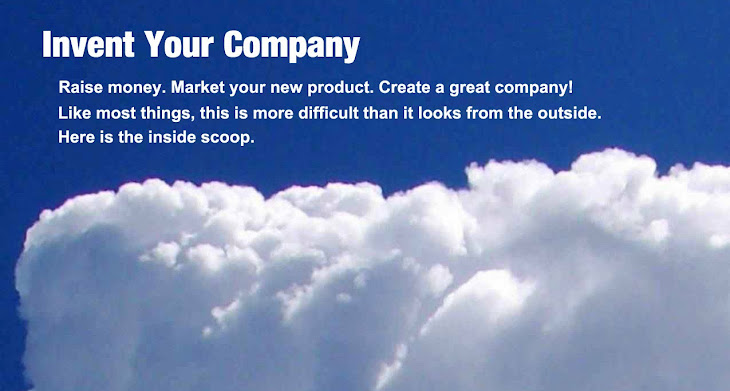In the evolution of private-equity investment, the line between angel groups and VCs blurs with what are referred to as "super-angel" groups. These entities behave like VCs in that they take institutional investments and raise funds into the tens of millions of dollars. These super-angels have stepped up investments since the recession began, whereas VCs have slowed down overall. In fact, the amount raised by these super-angel groups (from which they make their investments) is projected to double this year.
These hybrid entities are also referred to as "micro VCs," and an Internet search will turn up several firms that you may want to consider approaching if you meet their investment criteria.
Tuesday, January 31, 2012
Friday, January 27, 2012
Great Deal Flow Website
It is often difficult for entrepreneurs to find out about recent investing and M & A deal flow and valuations in their niche. Such information is critical in justifying your company valuation to potential investors or buyers. There are several resources that cost quite a bit of money that track deal flow and valuations. However, one free resource has quite a bit of information that you may find to be helpful. This is the NY Times' DealBook website. The preceding link takes you to an example of one of the reported deals. Enjoy!
Saturday, January 21, 2012
Fuji and Kodak
Innovators everywhere have good cause to mourn the finality of Kodak's loss of its place atop the technology heap as it filed for bankruptcy protection Thursday January 19, 2012.
Kodak's Japanese rival Fujifilm Holdings Corp., however, it doing just fine. Imagine that... a large Japanese company that outcompteted an American company primarily through innovation rather than by focusing on supply chain, efficiencies, engineering, attention to detail, and all those other typical components of "Japan Inc.'s" competitiveness.
Shigetaka Komori has run Fujifilm as its president since 2000 and as its CEO since 2003, so he was at the helm during the wrenching changes that took down Kodak. But Fujifilm took a much broader perspective on its technology assets, the future, and how to survive their unavoidable fusion.
Whereas Kodak focused primarily on converting its business from film-based to digital photograpy--it was a pioneer in digital technology--Fujifilm tooks its existing technologies and applied them to completely new markets like the ubiquitous LCD panels for devices such as the one you are now using to read this blog post. It even applied its science to cosmetics and health care markets.
"Fujifilm was able to overcome by diversifying," said Komori in a recent interview reported in the Wall Street Journal.
The lesson here is that innovation must be applied to markets and marketing as well as to technolgies if a company is to survive today's and tomorrow's rapid change.
Kodak's Japanese rival Fujifilm Holdings Corp., however, it doing just fine. Imagine that... a large Japanese company that outcompteted an American company primarily through innovation rather than by focusing on supply chain, efficiencies, engineering, attention to detail, and all those other typical components of "Japan Inc.'s" competitiveness.
Shigetaka Komori has run Fujifilm as its president since 2000 and as its CEO since 2003, so he was at the helm during the wrenching changes that took down Kodak. But Fujifilm took a much broader perspective on its technology assets, the future, and how to survive their unavoidable fusion.
Whereas Kodak focused primarily on converting its business from film-based to digital photograpy--it was a pioneer in digital technology--Fujifilm tooks its existing technologies and applied them to completely new markets like the ubiquitous LCD panels for devices such as the one you are now using to read this blog post. It even applied its science to cosmetics and health care markets.
"Fujifilm was able to overcome by diversifying," said Komori in a recent interview reported in the Wall Street Journal.
The lesson here is that innovation must be applied to markets and marketing as well as to technolgies if a company is to survive today's and tomorrow's rapid change.
Tuesday, January 17, 2012
$50,000 Business Plan Contest
Ben Franklin Technology Partners of Central and Northern Pennsylvania recently announced a business plan contest for businesses in their 32-county service area. The grand prize is the tidy little sum of $50,000.
I have assisted companies that have won the grand prize in earlier similar contests, so if you live in the service area, please feel free to contact me via the "Have a Question?" box at the top of my blog for assistance in applying (ask me to contact you). There will be no fee for my services, as they will be provided via my role as a consultant with the Pennsylvania Small Business Development Centers.
Good luck!
I have assisted companies that have won the grand prize in earlier similar contests, so if you live in the service area, please feel free to contact me via the "Have a Question?" box at the top of my blog for assistance in applying (ask me to contact you). There will be no fee for my services, as they will be provided via my role as a consultant with the Pennsylvania Small Business Development Centers.
Good luck!
Subscribe to:
Posts (Atom)


